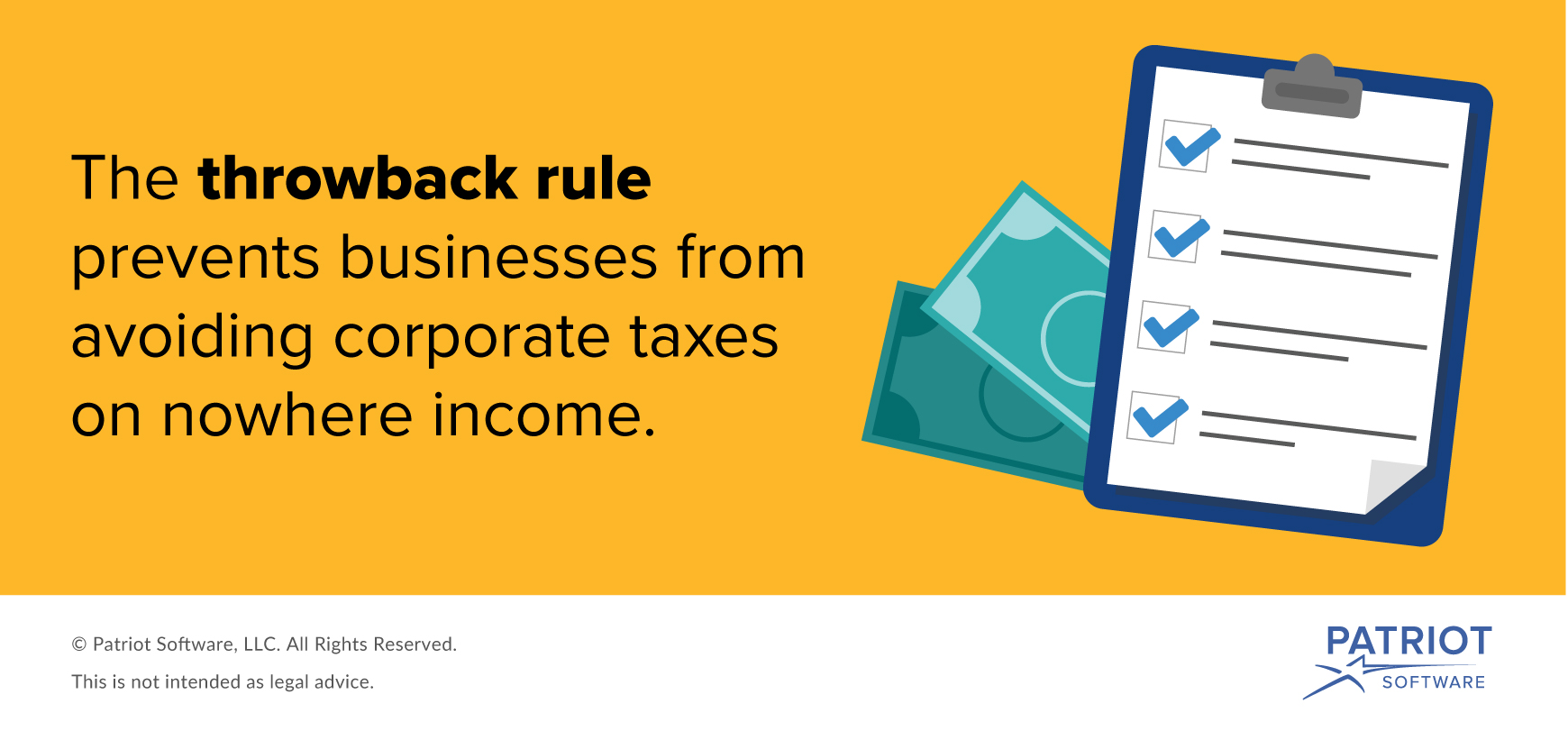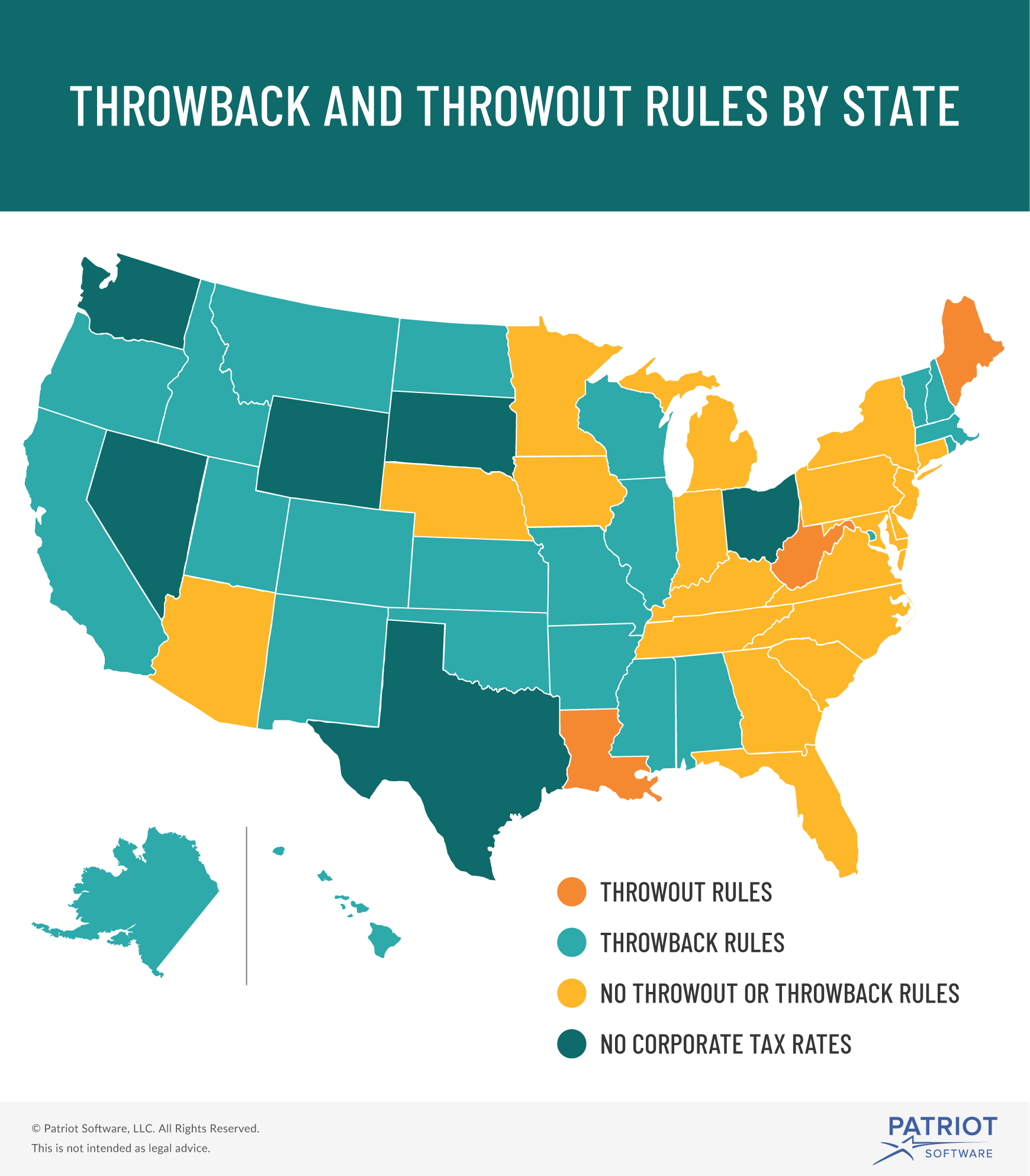When it comes to company taxation, each state has its own set of laws for businesses. And depending on your type of business structure, you might be subject to different types of laws, such as the throwback rule.
Eager to learn more about the throwback rule? Read on to learn what it is and whether or not your state enforces a throwout or throwback rule.
What is the throwback rule?
The throwback rule is a law states can adopt to ensure corporations pay state tax on all of their profits. Every state that has corporate taxes must determine how much of the company’s profits can be taxed.
Many states use a formula that considers things like the business’s property, payroll, and sales in the state to determine taxable income. After reviewing these types of factors, the government can uncover “nowhere income,” which is income a corporation doesn’t pay tax on in a state.
Some companies might do business in multiple states and have tax nexus in additional states (e.g., sales tax nexus). When corporate income is divided among states for tax purposes, some income might be earned in states with no corporate taxation, thus creating nowhere income.
Without throwback or throwout rules, multi-state corporations generally end up with more nowhere income and a smaller tax burden. The throwback rule prevents businesses from avoiding corporate taxes on nowhere income.
Throwback rule vs. throwout rule
If you’ve heard of the throwback rule, you’ve likely also heard of the throwout rule. Even though these rules sound similar, they have different meanings.
The throwout rule is considered an alternative to the throwback rule. The throwout rule treats nowhere income differently than the throwback rule. A state’s throwout rule typically requires a corporation to “throw out” or exclude receipts from nontaxable states.
With both throwback and throwout rules, the state looks at the amount of sales. Here is the formula:
Sales With the State / Total Sales
When it comes to the throwback rule, the state includes nowhere income in the numerator (top number of a fraction) along with sales with the state.
With the throwout rule, nowhere income is “thrown out” from the denominator (bottom part of a fraction).
Throwback rules are much more common than throwout rules. As of 2019, three states have throwout rules and 23 states (including D.C.) have a throwback rule.
Breaking down throwback and throwout rules by state
So, which states have a throwback rule? Which states follow throwout rules? Check out all the answers to your burning questions below.
Again, the throwout rule typically requires a business to exclude receipts from nontaxable states. There are three states that have a throwout rule:
- Louisiana
- Maine
- West Virginia
Nearly half of the states enforce throwback rules. As a reminder, throwback rules make sure corporations pay taxes on all of their business profits. Throwback states include:
- Alabama
- Alaska
- Arkansas
- California
- Colorado
- Hawaii
- Idaho
- Illinois
- Kansas
- Massachusetts
- Mississippi
- Missouri
- Montana
- New Hampshire
- New Mexico
- North Dakota
- Oklahoma
- Oregon
- Rhode Island
- Utah
- Vermont
- Washington D.C.
- Wisconsin
There are 19 states that don’t have a throwout or throwback rule:
- Arizona
- Connecticut
- Delaware
- Florida
- Georgia
- Indiana
- Iowa
- Kentucky
- Maryland
- Michigan
- Minnesota
- Nebraska
- New Jersey
- New York
- North Carolina
- Pennsylvania
- South Carolina
- Tennessee
- Virginia
States with no corporate income tax don’t have any rules in place. Here are the states with no corporate tax rates:
- Nevada
- Ohio
- South Dakota
- Texas
- Washington
- Wyoming
Nevada, Ohio, Texas, and Washington levy gross receipt taxes in place of corporate taxes.
For more information about throwback or throwout rules, contact your state.
Throwback rule takeaways
Now that you know more about throwback and throwout rules, let’s briefly recap some key points :
- Throwback and throwout rules vary by state
- Throwback rules ensure corporations pay 100% of their state taxes
- There are six states that don’t have corporate income tax
- Nineteen states don’t have a throwout or throwback rule
- Three states have throwout rules
- Washington D.C. and 22 states follow throwback rules
Need an easy way to track your corporation’s taxes? Patriot’s accounting software lets you streamline the way you record your income and expenses. Get started with your self-guided demo today!
Interested in learning more? Head on over to our Facebook and give us a like. We always enjoy making new friends!
This is not intended as legal advice; for more information, please click here.





